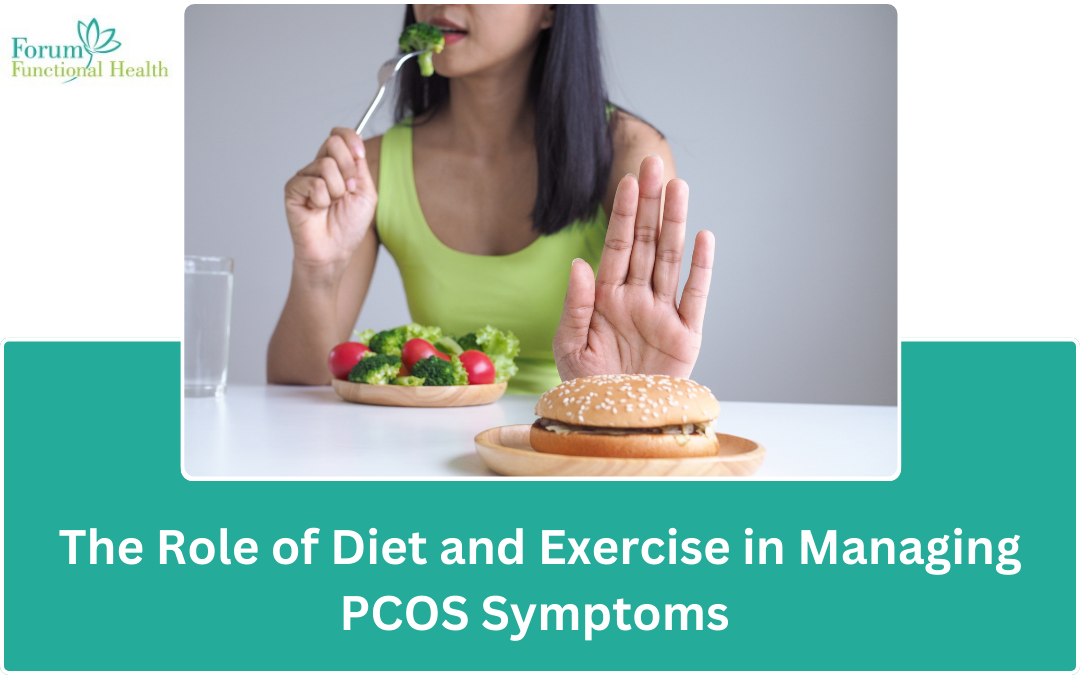Polycystic Ovary Syndrome (PCOS) affects millions of women worldwide, causing hormonal imbalances that can lead to a range of symptoms, including irregular periods, infertility, weight gain, and more. While there is no cure for PCOS, lifestyle modifications, particularly focusing on diet and exercise, can play a crucial role in managing its symptoms and improving overall health.
Understanding Polycystic Ovary Syndrome (PCOS)
PCOS is a complex hormonal disorder that affects women of reproductive age. It is characterized by elevated levels of androgens (male hormones) in the body, which can lead to irregular menstrual cycles, ovarian cysts, and difficulties with ovulation. Additionally, insulin resistance is commonly associated with PCOS, leading to increased risk of type 2 diabetes and weight gain.
The Impact of Diet for managing PCOS symptoms
Dietary choices can significantly influence PCOS symptoms and overall health. A diet rich in whole foods, including fruits, vegetables, lean proteins, and whole grains, can help regulate blood sugar levels and insulin resistance, which are key factors in managing PCOS.
Balancing Macronutrients: Focus on consuming a balanced mix of carbohydrates, proteins, and fats to promote stable blood sugar levels. Opt for complex carbohydrates like whole grains, legumes, and vegetables over refined sugars and processed foods.
Choosing Healthy Fats: Incorporate sources of healthy fats such as avocados, nuts, seeds, and fatty fish like salmon into your diet. These fats can help reduce inflammation and improve insulin sensitivity.
Managing Portions: Be mindful of portion sizes to prevent overeating and promote weight management. Monitoring portion sizes can also help control calorie intake, which is important for managing weight, a common concern for women with PCOS.
Limiting Sugary Foods: Minimize intake of sugary foods and beverages, as they can cause spikes in blood sugar levels and exacerbate insulin resistance. Opt for natural sweeteners like stevia or small amounts of honey or maple syrup when needed.
Emphasizing Fiber: Incorporate high-fiber foods such as fruits, vegetables, legumes, and whole grains into your diet. Fiber helps regulate digestion, promotes satiety, and can aid in weight management.
The Importance of Exercise for managing PCOS symptoms
Regular physical activity is crucial for managing PCOS symptoms and improving overall health. Exercise helps increase insulin sensitivity, promote weight loss, reduce inflammation, and alleviate stress, all of which can benefit women with PCOS.
Cardiovascular Exercise: Engage in aerobic activities such as walking, jogging, cycling, or swimming for at least 150 minutes per week. Cardiovascular exercise helps burn calories, improve cardiovascular health, and boost mood.
Strength Training: Incorporate strength training exercises, such as weightlifting or bodyweight exercises, into your routine to build lean muscle mass. Muscle tissue burns more calories at rest than fat tissue, aiding in weight management.
Yoga and Mindfulness: Practice yoga, meditation, or other mindfulness techniques to reduce stress levels and promote relaxation. Chronic stress can exacerbate PCOS symptoms, so finding ways to manage stress is important for overall well-being.
Consistency is Key: Aim for consistency in your exercise routine, but also listen to your body and give yourself rest when needed. Over-exercising can increase stress levels and exacerbate hormonal imbalances, so finding a balance is essential.
Forum Functional Healthcare Approach
In addition to diet and exercise, a functional healthcare approach can provide comprehensive support for managing PCOS symptoms. Functional medicine addresses the underlying causes of health issues, taking into account the unique needs of each individual.
Personalized Nutrition Plans: A functional healthcare practitioner can help develop personalized nutrition plans tailored to your specific needs and goals. They may recommend specialized diets such as the low-glycemic index diet or the Mediterranean diet to optimize PCOS management.
Hormonal Balance Support: Functional medicine practitioners may utilize targeted supplements and herbs to support hormonal balance and alleviate PCOS symptoms. Common supplements include omega-3 fatty acids, vitamin D, and inositol.
Lifestyle Modifications: In addition to diet and exercise, functional medicine emphasizes lifestyle modifications such as adequate sleep, stress management, and toxin reduction to promote overall health and well-being.
Collaborative Care: Functional healthcare practitioners work collaboratively with other healthcare providers, including gynecologists, endocrinologists, and nutritionists, to provide comprehensive care for women with PCOS.
Managing PCOS symptoms requires a multifaceted approach that includes dietary modifications, regular exercise, and personalized healthcare interventions. By adopting a healthy lifestyle and seeking support from qualified healthcare professionals, women with PCOS can take control of their health and improve their quality of life. Remember, small changes can lead to significant improvements over time, so start today and prioritize your well-being.
Read More:- Understanding ADHD in Children: A Comprehensive Guide to Symptoms, Causes, and Treatment

